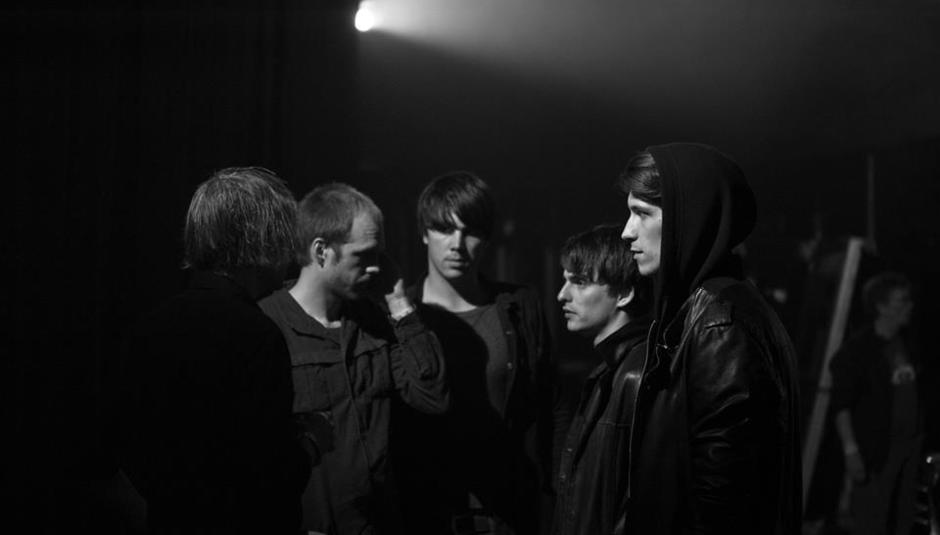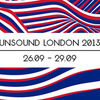Hailing from the city of Hagen in Germany's North Rhine-Westphalia region, The Blue Angel Lounge were formed in 2006 by Nils Ottensmeyer (vocals/guitar) and Dennis Melster (guitars). Members have come and gone ever since with the current line-up being completed by Lenz Plonka (bass), Theo Berwe (keys) and Christoph (drums).
Their first album, also entitled The Blue Angel Lounge came out at the back end of 2008, but it was follow-up Narcotica released two years later that brought them to the attention of a wider audience. Part-produced by Anton Newcombe of The Brian Jonestown Massacre, it's a swirling, occasionally panoramic statement of intent and undoubtedly one of the new breed of psych rock's pivotal records.
Earlier this year they put out a single, 'Walls', their first new material since 2012's Ewig EP. Again recorded at Anton Newcombe's studio in Berlin with Fabian Leseure, it shows a more melodic side than previously associated with the band. With album number three expected to be ready for the early part of 2014, it promises to be an exciting few months ahead for The Blue Angel Lounge.
DiS: Being asked to play Roskilde and then headline Aarhus Psych Fest must be something of a big deal for you?
Nils: It is! Roskilde's an honour to play because it's such a historic event. I'm not really into festivals at all, but Roskilde is one of the coolest, and obviously Aarhus will be amazing too.
DiS: I guess The Blue Angel Lounge do stand out when placed on bills with mainstream acts at events like Roskilde. At the same time though, it's an excellent opportunity to attract new fans, no?
Dennis: I think it's more like an experiment. We do want to reach out to people that might normally never hear our music, but at the same time I don't really care if there's a scene around the music we're doing. It's nice if people get into the band through seeing us at a festival but we're not overly concerned if they don't.
DiS: How did the opportunity arise for you to headline the Aarhus event?
Nils: I don't know how it happened! No, the organisers wrote to us and asked if we wanted to headline, and we couldn't really say anything other than "Yes!" But why they chose us over so many other great bands, nobody knows.
DiS: There does seem to be an awful lot of Psych Fests popping up this year. Good or bad?
Dennis: They're popping up everywhere!
Nils: There's a really nice one in Paris now. It's almost like everyone has told everyone else that they're starting one so the next person's automatic reaction is to start one too! I guess a lot depends on the bands and who's playing. If a lot of interesting bands get to play at numerous events then I guess it has to be a good thing.
DiS: Are you surprised at the way the Psych scene has taken off? It's actually become quite a global phenomenon with the Austin event proving so popular this year as well.
Dennis: As scenes go it is cool to be associated with this one, even though I guess with Psych being popular right now it's more like a trendy thing. I see people walking around every day and can immediately tell whether or not they're into that kind of music. Whereas ten years ago you wouldn't be able to notice if they were into that kind of thing.
DiS: Is there much of a Psych scene in Germany?
Dennis: I don't know of many other bands who are playing this kind of music in Germany.
Nils: The Lost Rivers are the only ones that spring to mind. I think they're doing well in a lot of places - the UK for instance - but their shows don't tend to do that well back in Germany.
Theo: I think it depends on which areas of Germany bands play in. Some of the bigger areas have their own concentrated scenes - Berlin and Hamburg for instance. Whereas the rest of the country can be difficult to attract an audience.
Dennis: It's hard for young bands who are making music to suit a specific taste or genre to get popular in Germany. There just isn't the same kind of music movement as you get in places like the UK. There's hardly any venues where you can go to see a new German band.
DiS: Is it quite hard for German bands to get gigs in Germany?
Nils: Very. Every promoter waits for overseas bands to tour from the US or UK. It's so much easier to find gigs in Germany if you're a foreign band. It's crazy.
Dennis: There's a stigma that if you're a German band and still based in Germany then you must be shit or ripping off someone from the UK or US. Whereas any band that comes overseas is automatically seen as being original. People think because they're coming from the places where rock and roll all started they must be good.
DiS: It's interesting hearing you say that because I actually heard Narcotica before I heard your first record. Do you think there's a danger for German bands that overseas listeners might never get to hear their music?
Nils: To be honest, we don't mind people hearing Narcotica first. With the first album, we did it just for fun and then we put it out. At the time we never really expected anyone to take it seriously. So it was a surprise to us that the response was good, and then afterwards when Narcotica came out it just grew. We had a better dynamic by that point and different people in the band, plus we also had a fanbase at that point which helped motivate us. It meant we had more fun playing shows. I guess that's why we're where we are at now. Trying to figure out what to do next. Do we want to stay low-key forever or do we want to branch out and do it for real, you know?
DiS: Anton Newcombe co-produced Narcotica. How did he become involved with the record?
Dennis: He's friends with Olli Konuk from our label, 8mm Musik. They lived together for a while in Berlin. Olli's put out records by Singapore Sling and Anton is good friends with them, and then Olli signed us, so there was already a connection there. Anton's always around and he saw us play live and afterwards said he'd like to help us out. He has a studio in Berlin so it made sense for us to record there. I guess we didn't really work with him that much - not directly anyway - but it was great to record in his studio.
DiS: Did meeting Anton Newcombe have an influence on the way you approached songwriting and recording?
Dennis: I don't think so, not in terms of our working process anyway. Maybe he gave us a lot more confidence about what we should do? He gave us several tips and advice here and there, but he was not really that much involved in it either. He didn't put forward any crazy ideas or change anything.
Nils: He spent a lot of time surfing the internet for crazy stuff, seeing what's going on elsewhere.
Dennis: It was cool to have him around. When we started The Blue Angel Lounge his music was a major influence, so the fact he was there was quite a spiritual thing for us.
DiS: Will he be involved with the third album?
Dennis: No, he's not really involved with that.
Nils: We're recording it in his studio with Fabian Leseure who produced the last Brian Jonestown Massacre record. He's given us a few pieces of equipment as well which we're using on the album.
DiS: You recently put out a single, 'Walls', which was quite a departure sonically from a lot of your previous work. Is that indicative of how the new album will sound?
Dennis: It's definitely a progression. I think you can hear it on the Ewig EP as well. But it's also really hard to explain...
Nils: I think the biggest progression is learning how to make it work in a real studio and get comfortable with the overall recording process. Previously we tended to have issues when it came to recording so we always kept it simple before. Here, we've been demoing stuff and trying out new ideas.
Dennis: I guess with Narcotica it was pretty straightforward. We didn't really change anything from the demos to the finished version. I don't think the sound of the new stuff is significantly different to what we were doing before, but it does have a new found flair in there.
DiS: It's three years since Narcotica came out. Has the new album taken the majority of the ensuing years to write and record? Wghat's been the main reason it's taken so long?
Nils: We had to grow up in many ways! We weren't really that confident in the studio and then we'd always get distracted if we were touring. We found it difficult getting motivated and finding the inspiration to do something again afterwards. Some people always accuse musicians of being lazy and I guess that could be applied to us as well. It's really hard trying to grasp a sense of what to do next. I think we've put a lot more effort into finding our direction over the last year or so. We're definitely more concerned about what we want to achieve with this record.
Dennis: The downtime over the past couple of years was necessary as well. It's given us the breathing space to find our sound. We're always going to be compared with other bands but I feel we've become a lot more original on these newer songs.
DiS: Is there a final release date as to when the album is likely to come out?
Nils: No. We're still in the middle of making it. We don't talk about it that much. We want to release it as early as possible, hopefully by the end of this year, but it depends on many other things.
DiS: The band's line-up has changed several times over the years. Is the current line-up the one you're most comfortable with in terms of moving the band forwards and progressing in the future?
Nils: The changes we've made were necessary at the time. We had problems with our previous drummer, and our original bassist is married with a young child, so he couldn't commit as much time to the band as he'd liked to. We have a new drummer (Christoph), although he's not sure whether he wants to be in the band full time yet. It's a question everybody discussed in the rehearsal room yesterday. Like, who's in charge of taking decisions? With the last two albums, there was a lot of input from the outside like the record label for instance.
Dennis: With the first record definitely. I think the second album was a little bit more experimental from our perspective, certainly with the studio anyway.
Nils: This time it feels like we're fully in charge of our own destiny. Which means we get to have the final say on a lot of things like when the record will be released. How the record will be released. There may even be new people coming in because nobody is satisfied about just being within the psych scene all the time. And I think our music has grown in so many ways since the band started. It's not just meant to be psychedelic. So we want to embrace the right platform so we can reach out to more people. Sometimes that means moving to different locations from where we'd normally go. Recently we played at the Wave Gothic Festival in Leipzig for example and it was great. Nobody knew who we were and the feedback we got was incredible. We actually sold more merchandise than any other band at that festival. We had fifty-year-old guys coming up to us after saying, "This is fucking amazing!" It was a completely different crowd to what we're used to playing and it worked perfectly. I would probably say it was up there with the best gigs we've ever played. I think it also showed us that the possibilities are endless in terms of who we can reach with our music.
Dennis: The band has developed so much, especially since the last album. We have this new song called 'Winter' and it's how I'd perceive the new album to sound. It's almost become the flagship for that record. It goes way beyond the point of where 'Walls' or the previous EP left off. It's like a big pop tune but then it also has its own language. It's definitely a progression in that it feels much more condensed than anything else we've done previously. The arrangement is different too.
DiS: Is everyone involved in the songwriting process on the new record?
Dennis: It depends really. Mostly it is just me and Dennis but the rest of the band are more involved this time around. A lot depends on who comes up with a new idea and whether or not everyone else wants to work on it. There's no rule about it. If it's good we'll work on it.
Nils: I think that's a really strong characteristic about this band. Everybody in The Blue Angel Lounge has a particular gift or strength. For example, I'd compare me and Dennis to a Christmas Tree when we're writing. I put up the tree, and he decorates it! We're not reliant on just one person. It's becoming more of a collective.
DiS: You've toured with several internationally renowned bands; The Dandy Warhols, A Place To Bury Strangers and The Brian Jonestown Massacre being three. Do you feel the band has learned much from those experiences?
Nils: Again, I think playing with those bands has given us more confidence in what we're doing. With The Dandy Warhols it's like a nostalgic thing to me. I listened to their album Come Down when I was twelve and it had a massive influence on my musical interests, so when we got to support them I was kind of awestruck to be sharing the same stage as them.
Dennis: It was interesting to get the opportunity to sit and talk with those guys and hear about their experiences and in some cases, how they dealt with them. I don't know whether we can learn much from that?
Theo: I think it made us tighten up our live performance in that we only got a thirty-minute set, so had to make it as dynamic as possible in the short time we had. Before that there would have been long silent pauses between songs, whereas on that tour we really worked the set. It made us act more professionally.
Nils: I think we learned a lot from A Place To Bury Strangers as well. When we played with Interpol we were so much younger then, so we couldn't learn much because there was this huge distance between us and them. We didn't meet them once backstage. We'd occasionally see them going out and that was about as far as it went. I guess you could say the biggest learning point was seeing the three different approaches between The Dandy Warhols, A Place To Bury Strangers and Interpol in terms of how to be a band. I suppose if we add The Brian Jonestown Massacre to that list who we've toured with as well you've got an even more extreme opposite to the rest! It's interesting. There are so many bands around, and some work like this, others like that.
DiS: Do you find it a challenge playing to someone else's audience?
Nils: I think it's still the same as playing at a festival in that you don't know what you're going to get. I guess with most of the bands we've played with, we're fans of their music and there are similarities in where we're coming from musically so I'd expect their audiences to see that also. If we choose the right songs and play well then there's no reason why we can't reach those audiences. It comes down to being confident about what we're doing, which I think we are now. I do enjoy playing to new audiences that might not be familiar with our music, even if sometimes the end result isn't quite what we'd hoped it would be.
DiS: Will there be a tour for the new album and if so, any UK shows?
Dennis: Hopefully although where that tour will take us we really don't know. We don't really have the infrastructure to commit ourselves to overseas tours just yet. We haven't got a booking agent at the moment. Maybe in the future!
For more information on the band visit their official website and artist page on the 8mm Musik website.






















